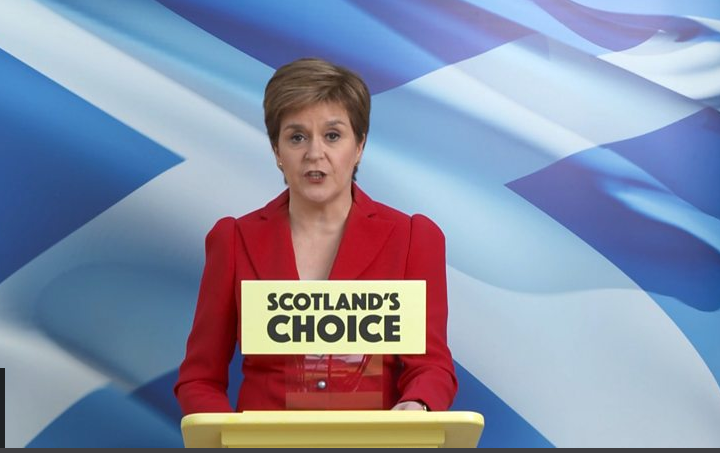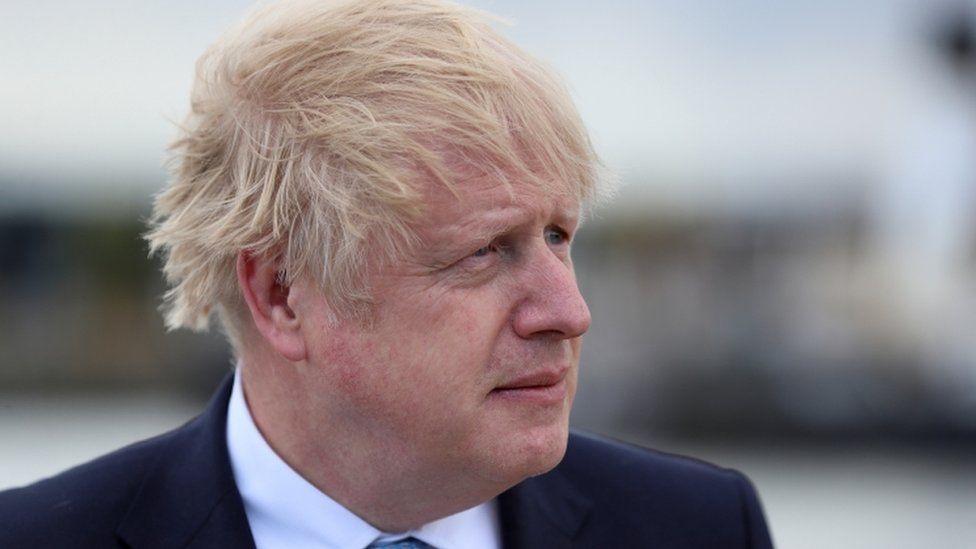Scottish election 2021: Nicola Sturgeon celebrates ‘historic’ SNP election win

From BBC
Nicola Sturgeon has hailed the SNP’s “historic and extraordinary” fourth consecutive victory in the Scottish Parliament election.
With all the results in, the SNP has finished on 64 seats – one short of a majority but one more than it won in 2016.
Ms Sturgeon said her priority was to steer the country through the pandemic.
But she said she still intended to hold an independence referendum once the crisis has passed.
And she said there was no democratic justification for UK Prime Minister Boris Johnson, or anyone else, to attempt to block it
With all seats now declared the SNP has won 64, the Conservatives 31, Labour 22, the Scottish Greens eight and Liberal Democrats four.
Ms Sturgeon said her party had won the most constituency seats and secured the highest share of the constituency vote in the history of devolution.
And she pledged that “the task of building a better Scotland for everyone who lives here will be my priority every single day.”
Ms Sturgeon said her focus in government would be on leading the country through the pandemic and keeping people safe from Covid.
She added: “It is then to kick-start and drive our recovery with an ambitious and transformative programme for government.
“And, yes, when the crisis has passed, it is to give people in Scotland the right to choose their future.
“All of that is what I promised and all of that is what I intend to deliver.”
She said the result of the election meant there was “no democratic justification whatsoever for Boris Johnson or anyone else seeking to block the right of the people of Scotland to choose our future.”
And she insisted that holding a referendum was now “the will of the country”.


Mr Johnson, the UK prime minister, told the Daily Telegraph newspaper earlier on Saturday that it would be “reckless and irresponsible” to hold a referendum right now.
He added: “I listened to the Scottish election carefully. My impression was that they [the SNP] moved away from the idea of a referendum, and I think very wisely.
“I don’t think this is anything like the time to have more constitutional wrangling, to be talking about ripping our country apart, when actually people want to heal our economy and bounce forward together. That’s what people want.”
The Scottish voting system was specifically designed to prevent any one party having a majority in the 129-seat parliament – although the SNP did manage to do so in the 2011 election.
The SNP, which formed a minority government after the last election in 2016, had hoped that winning another majority in this election would further strengthen its calls for a second referendum on Scottish independence to be held.
It would also have allowed the party to pass laws and the Scottish government’s annual budget at Holyrood without having to rely on the support of any other party.
But there will be another, slightly increased, pro-independence majority in the parliament thanks to the seats allocated to the Scottish Greens through the regional list system and the additional seat won by the SNP.
However, the Alba Party – which was formed by former SNP leader and first minister Alex Salmond – will not win any seats.
Polling expert Prof Sir John Curtice said the results have seen 51% voters backing pro-UK parties in the constituency ballot – and 51% backing pro-independence parties in the regional list ballot.





The SNP’s victory in these elections means the party is heading for at least 19 years in power. That’s remarkable.
Some will be slightly disappointed at not achieving a majority. But the fact there is a comfortable pro-independence majority means the issue is going to continue to be a significant one in Scottish and UK politics for years.
In Downing Street, the plan was always to say no to indyref2. That hasn’t changed today, meaning a big political and potentially legal battle is coming.
But maybe not immediately. Nicola Sturgeon has said her immediate focus will be the pandemic. That’s one way in which the Scottish and UK governments agree.



The SNP won two seats from Labour and one from the Conservatives in the constituency results that were declared on Friday.
But those wins caused the party to lose seats on the regional list, effectively cancelling out some of the gains it has made.
No other constituency seats have hanged hands after Thursday’s vote, which saw a record turnout for a Scottish Parliament election despite the Covid pandemic.
But the SNP’s Kaukab Stewart and Pam Gosal of the Scottish Conservatives making history by becoming the first women of colour to win seats in the Scottish Parliament.
The SNP has pledged to push forward with legislation for a second Scottish independence referendum and have said they could go to the courts if the UK government attempts to block it.
Ms Sturgeon has also said she will not hold an illegal wildcat vote on the issue, arguing that it would not actually lead to Scotland becoming independent because the result would not be recognised by the UK government or the international community.
And she has repeatedly stressed that she would only want a referendum to be held once the pandemic is over.
Opinion polls suggest that voters are essentially split 50-50 on the question of whether Scotland should be an independent country.


SIGN UP FOR SCOTLAND ALERTS: Get extra updates on BBC election coverage


For more on this story and video go to: BBC





